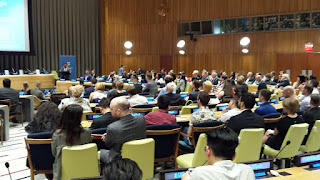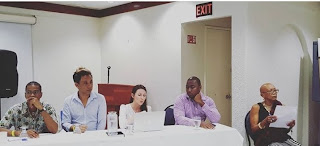If leaders cannot publicly defend their LGBT Relatives, is there any hope in governance?
1st April, 2014
Thematic hearings at the OAS was done on March, 28th, 2014, most importantly, it was the first LGBTTI thematic hearing done for Belize in 32 years of its independence. It was constructive, engaging and informative as the Inter-American Commission asked for additional evidence of discrimination in education and employment and workplace while the state was asked about data it has on crime an violence. After the hearing, we sat down with the Commission, International partners and the ambassador to discussion the process of precautionary measures issued by the the Commission along with dynamics of mechanism.
Afterwards we met with Tracy Robinson to look at different approaches to engagement with the state on LGBTTI issues. For the first time, Jamaica and Belize was side by side with our Latin American counterparts. It was clear that the approval of laws were not sufficient to ensure rights enforcement and protection, that established mechanism require penalities for acting unprofessional or being negligent in duties, that the issue was about addressing hearts and minds along with sufficient budget allocations and personnel to carry out investigations.
The experience is shared to make the point that political engagement matters and that its cumulative in its effects at the national, regional, hemispheric and global level. The point is made as well that Belize's political leaders have families and relatives. If they have never been comfortable in publicly defending their L.G.B.T relatives, what hope is there that they would be willing to acknowledge and invest in the protection of L.G.B.T citizens that are not their relatives.
It would be historical to see the PM, a minister of cabinet, a representative of the opposition speak about their L.G.B.T families and to see in a party manifesto, their commitment to non-discrimination. It would be valuable to see how official research could transform policy and legislative framework.
In the meantime, L.G.B.T concerns seems to require 1). political engagement that include sensitization of terms and awarenesss raising of laws that protect and discriminate. 2). It requires an investment in mechanisms that has resources to support rights enforcement and protection 3). It requires a hearts and minds approach. 4). It requires that individual come out the closet as L.G.B.T citizenry clout in not in their public stance, but their collective private stance. Politicians cannot claim, they don't know, if they can see. Religious leaders cannot say they don't know, if they can see. Families cannot say, they are the only ones, if they can see. See, that collectively, there is a presence of diversity, with lives of dignity exercising their rights to movement, expression and association.
In 32 years of independence, Belize has never had to deal with its L.G.B.T citizenry. It leaders are now challenged to look at the laws through the lens of gender and sexuality. The issues of unemployment, education access, shelter, sexual and reproductive health, relationship security, poverty, the elderly, indigenous, children, youth all have a cross-cutting theme. It will be interesting in the years to come to see how our governance structure response or reacts to these issues. It will be interesting to see if LG.B.T Citizens becomes collateral damage as the country progress to the next general election or integrated on the basis of respect for diversity.





Comments
Post a Comment